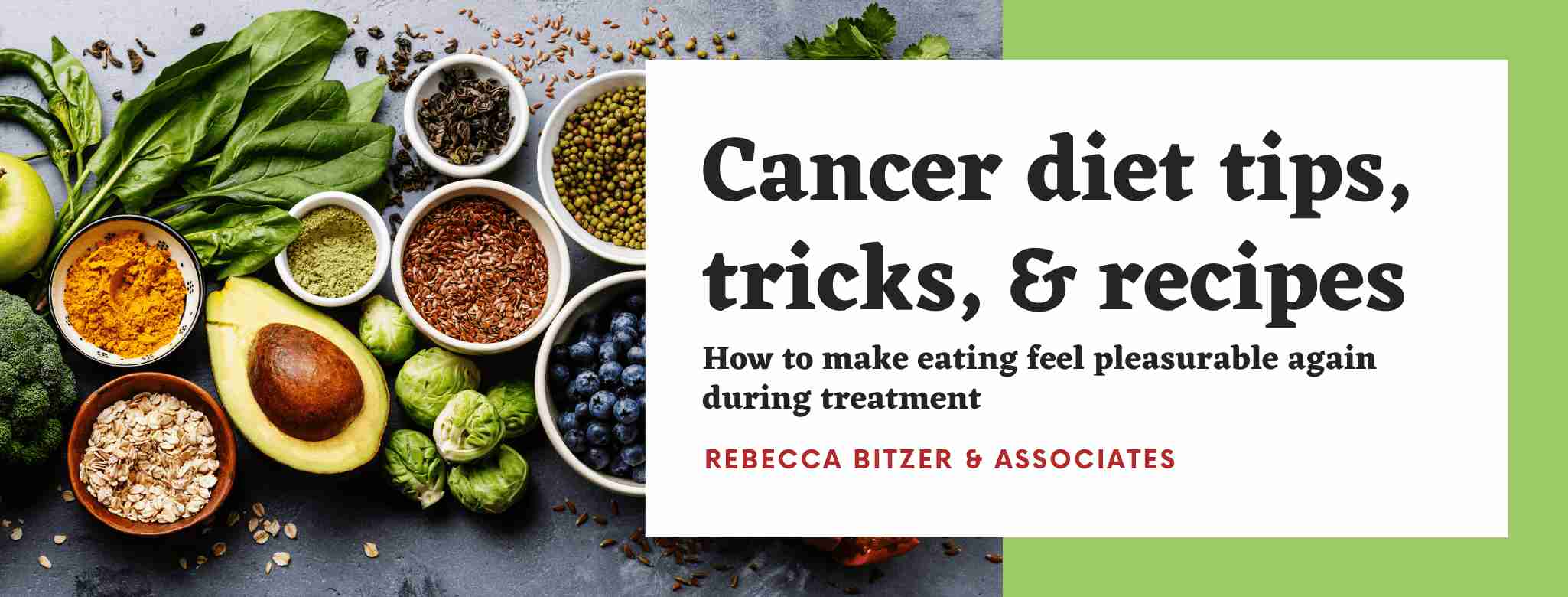Food and nutrition is an important part of your recovery from cancer and we are here to give you cancer diet tips to help you stay nourished during treatment.
How your cancer diet may be impacting your treatment
Cancer treatment can take an incredible physical and emotional toll on your life. While you may have anticipated changes like hair loss or fatigue, you may have been less prepared for symptoms that have wreaked havoc on your appetite and digestive system.
Symptoms like constipation, lactose intolerance, taste/smell changes, dry mouth, sore mouth, and weight loss can decrease desire to eat. When eating feels too hard or uncomfortable, it can become difficult to maintain the strength you need to keep fighting through your cancer treatment.
We’re here to remind you that you’re not alone. We understand that this is a trying time physically and emotionally and are here to help. With proper nutrition support, it is possible to address some of the most common symptoms that cancer patients face so that eating can once again feel like a pleasurable and welcome experience.
While we discuss some possible solutions to common discomforts, we also highly recommend scheduling an appointment with one of our knowledgeable dietitians who can make personalized nutrition recommendations that fit your specific tastes and needs.
Disclosure: This post contains affiliate links. This means I earn a percentage of any sales made through those links, at no extra cost to you. Affiliate links are identified with an asterisk (*).

Addressing common nutrition concerns with your cancer diet
Constipation
In general, constipation is often a result of dehydration, inadequate fiber intake, and decreased physical activity. These factors can be compounded during cancer treatments by chemotherapy, the location of your cancer, and medications.
Many people don’t drink enough water. We suggest trying to drink 8 cups of liquid a day (uncaffeinated and unsweetened is preferable). You may find it useful to carry a reusable water bottle with you to remind you to take sips throughout the day.
To help soothe an upset stomach, try consuming warm beverages like hot water with lemon or herbal tea.
For some, increasing fiber intake may be beneficial. Always speak with your doctor before increasing fiber as individuals with certain cancers should not consume a high-fiber diet. When increasing fiber, it’s important to start slowly, as too much fiber all at once can cause gas or make constipation worse.
Consider adding some of these high fiber foods into your cancer diet:
- Berries like blueberries, raspberries, and strawberries
- Vegetables like broccoli, Brussels sprouts, corn, and carrots
- Nuts and seeds like almonds, walnuts, and chia seeds
- Whole grains like whole wheat bread, oatmeal, and brown rice
- Legumes like black beans, split peas, and lentils
Not sure how to get more fiber into your meals? Try one of our original recipes!
We have homemade almond granola bars which are perfect for on-the-go, baked oatmeal for a comforting breakfast, beef and sweet potato chili for chilly evenings, black bean burgers for a cookout, chia seed pudding, lentils with rice and veggies, or a classic quinoa and black bean bowl.

Lactose intolerance
Lactose intolerance refers to the body’s inability to digest lactose, a sugar in dairy products, which results in symptoms such as gas, cramps, and diarrhea. Many people experience the development of lactose intolerance as they age.
During cancer treatment, an existing intolerance can become more severe while some individuals may develop a new intolerance. Symptoms of lactose intolerance which develop during treatment can last for anywhere between a few weeks, to even months after treatment ends.
It occurs most commonly during cancer treatments involving radiation therapy to the abdomen or pelvis, or surgery or antibiotics which affect the digestive system.
Consider the following options:
- Talk to your doctor about lactase pills that break down lactose in foods
- Try lactose-free products like Lactaid brand milk, ice cream, cottage cheese, and sour cream
- Switch to plant- and nut-based milks, cheeses, and yogurts (ask your dietitian for recommendations, there are many!)
- Consider eating hard cheeses (like parmigiano reggiano and pecorino romano) that contain significantly less lactose than their softer counterparts
- You don’t have to go vegan, but you may try some foods marketed as such that are all dairy-free
Some of our favorite dairy-free recipes include mac and cheese, pizza, spicy queso, and cup of dirt for dessert!

Taste/smell changes
Taste and smell changes are extremely common side effects of many cancers and treatment methods. Some foods may taste of nothing at all, others may taste bitter or metallic, while still others may taste or smell downright sickening. We recommend trying a few of the following to see what works best for you:
- Suck on lemon candies or drinking lemon water before meals to “wake up” your taste buds (sounds silly, but works for many people!)
- Avoid using metal cutlery and try using plastic instead
- Enhance food flavoring by adding more herbs and spices or marinating items in flavorful dressings and sauces (salty flavors and tart flavors come through best)
- Swap red meats for white meats, beans, and legumes
- Reduce smells by eating foods cold or at room temperature, put lids on beverages, and avoid eating in spaces that are too stuffy or warm
Consider one of these flavorful recipes when nothing else seems to taste good: A simple one pan balsamic chicken and veggie dinner, these chicken thighs with cranberries, a quick vegetarian stir fry, or a delicious chicken teriyaki.

Dry mouth
Dry mouth can make your mouth feel sticky, making it harder for you to talk, chew, and swallow. Dry mouth is a common symptom for those undergoing radiation or chemotherapy, especially for cancers of the head and neck region.
Treatment in these areas can damage saliva glands which are vital for producing saliva and keeping your mouth moist. To help offset dry mouth symptoms there are a variety of things you can try:
- Try more tart foods like lemonade or our cranberry and orange smoothie recipe. Tart foods are not recommended if you are also suffering from mouth sores.
- Keep your mouth moist by sipping water throughout the day. Carrying a bottle of water with you can help remind you to stay hydrated as well.
- Chew gum, suck on hard candies, or freeze juice and fruit into popsicles.
- Opt for foods that are easier to swallow like pureed/soft foods and soups (try our lentil curry or lentil soup) or using sauces or dips to help dry foods go down more easily.
Mouth Sores
Mouth sores may present as tender gums and little cuts or ulcers in your mouth. Like dry mouth, mouth sores are a common symptom for those undergoing radiation or chemotherapy, especially for cancers of the head and neck region.
It is typically expected that mouth sores will resolve once treatment has concluded. In the meantime, mouth sores may make chewing and swallowing more painful, so we recommend the following:
- Eat soft, easy to chew foods, like beans, oatmeal, puddings, smoothies, ice cream, and soups.
- Moisten foods with sauces, dips, or dressings.
- Cut foods into smaller pieces or use a smaller utensil to reduce the amount of food in your mouth at one time.
- Drink with a straw to help direct liquids away from sore areas.
- Suck on ice chips to numb the mouth and provide a soothing sensation.
- Eat foods that are cold or room temperature, not hot.
- Avoid foods that are acidic, citrusy, spicy, or salty.
- Limit hard and crunchy foods like raw vegetables, chips, crackers, and dry breakfast cereals.
- Avoid alcoholic beverages.

Weight Loss
Weight loss is extremely common and extremely dangerous during cancer treatment. Weight loss can herald the onset of more serious complications like malnutrition that can significantly reduce the effectiveness of your treatment and lower positive health outcomes.
Weight loss can also affect the dosage of your medications and treatments. Maintaining your weight through adequate nutrition is key to keeping up your strength during this trying time.
When eating is difficult due to any of the symptoms discussed above, along with nausea, vomiting, and increased stress, maintaining a healthy weight can be challenging. We recommend trying the following:
- Eat on a schedule. We would recommend to schedule 5-6 small meals throughout the day as this can make food more approachable and easier to eat (vs. 3 larger meals).
- When you do eat, make sure that it is packed with nutrients, protein, and healthy fats. A simple way to do this would be by adding calorie-dense toppings like olive oil, nuts, greek yogurt, avocados, honey, nut butters, or jams to all foods.
- If you don’t feel like eating solids, opt for smoothies, milkshakes, or soups but make sure these are also nutrient dense with plenty of protein and calories. You can buy these from Kate Farms*, Boost Very High Calorie*, or Ensure Plus*. Consider these nutrient-dense recipes:
Cranberry orange smoothie bowl
Hummus Crusted Chicken
Peanut butter chocolate chip cookie dip
Chocolate protein muffins

Do not go on a diet. It’s not uncommon for people to consider weight loss a “silver lining” of cancer, believing that weight loss in all circumstances is a “healthy” endeavor. This could not be further from the truth.
Even if you are accustomed to eating low-calorie, low-fat, or low-carb foods normally, it’s important that you put your motivation to consume these foods on the back burner during your treatment. If this feels challenging, it’s important that you speak with your dietitian about the physical and emotional barriers you may be facing sooner rather than later.
Cancer Diet in Summary
Whatever symptoms you may be having, know that you are not alone! Every individual is unique in what combination of symptoms they might experience. It can be tricky trying to figure out what foods help alleviate your unique symptoms, which is why our dietitians are here to help.
With a little trial and error, and a lot of professional guidance, we can help you meet your nutrition goals during cancer treatment while also helping you feel your best.
Not sure what to do for your Cancer Diet or help with your individualized cancer diet, reach out to us for a consultation.
-Blog contributions from Amaris Galik and Haley Kappey
-Blog reviewed and updated by Rebecca Bitzer MS RD LD August 31, 2021
Rebecca Bitzer loves to empower Registered Dietitian Nutritionists (RDNs) and their clients. Co-author of Welcome to the Rebelution: Seven steps to the nutrition counseling practice of your dreams and Taste the Sweet Rebellion: Rebel against dieting.



